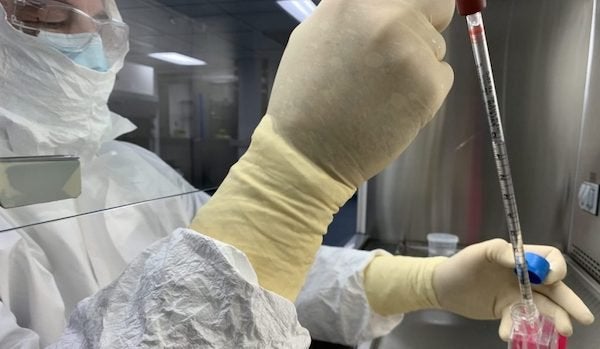The following URI College of Pharmacy research awards represent the effort and hard work that researchers have endured during a challenging work environment. The COP Research Committee would like to recognize all COP investigators for leading the research community and showing their commitment to research progress at the University.
This list is a compilation COP research awards starting at the University between July 2020 and December 2020.
 Xerong Wen
Xerong Wen
Neonatal Neurodevelopment and Maternal Outcomes in Pregnancy with Opioid Exposure (Supplement) (September 2020, National Institute of Health, $256,727) — This awarded project focuses on the effects of maternal opioid use on adverse neonatal outcomes, major congenital malformations, minor anomalies, and neurodevelopmental outcomes for children. Advanced pharmacy, epidemiological and statistical methodologies will be applied to reveal the mechanisms of opioid-induced drug teratogenicity. Furthermore, this project provides a technical training environment for undergraduate students at the University of Rhode Island, College of Pharmacy.

 Ami Vyas and Stephen Kogut
Ami Vyas and Stephen Kogut
Impact of Patient Out-of-Pocket costs for Oral Anticancer Medications on Medication Adherence (July 2020, Pharmacy Quality Alliance, $74,556) — The purpose of the study is to identify the significant patient access barriers and facilitators of adherence to oral anticancer medications. The study will examine out-of-pocket costs, socioeconomic characteristics, clinical factors that affect adherence to oral anticancer medications, and if medication non-adherence affects subsequent health outcomes in patients with cancer.
 William Van Nostrand
William Van Nostrand
Efficacy of siRNA to prevent cerebral amyloid Angiopathy in rTg-DI Transgenic Rats (November 2020, Alnylam Pharmaceuticals, $10,000) — Currently, there are no effective therapies to treat cerebral amyloid angiopathy, a condition that involves accumulation of amyloid in brain blood vessels that can lead to restricted cerebral blood flow, stroke, hemorrhage and cognitive decline. Van Nostrand’s team has generated transgenic rats that develop cerebral amyloid angiopathy and are a useful preclinical model to test new potential therapies to treat this condition. The goal is to test a new, promising therapeutic intervention for cerebral amyloid angiopathy in this model.
 Jie Shen
Jie Shen
Bioequivalence Considerations of Topical Rectal and Vaginal Products (September 2020, Food and Drug Administration, $250,000) — The major goal of this project is to develop comparative product characterization-based bioequivalence approaches that are suitable for topical rectal and vaginal drug products, and to help advance regulatory review and approval processes for these products.
 Navindra Seeram
Navindra Seeram
Providing Publishable Standards of Identity and Unique Compositional Chemistry Findings of Maple Sap Products for Increased Market Promotion and Sales (September 2020, US Department of Agriculture, $491,350) — Maple sap (maple water) products are produced from sap tapped directly from maple trees, but there is confusion and lack of industry consensus and consumer knowledge as to what constitutes “authentic” maple water. This project will provide publishable Standards of Identity and unique compositional chemistry findings of maple water, which will help define, authenticate and distinguish it from other functional beverages, thereby positioning the maple industry for promotion and growth in this market sector. By leveraging the URI Maple Collaborative web portal and social media platforms created for maple promotion (www.uri.edu/maple), URI’s Cooperative Extension outreach network, and commercial U.S. maple water producers’ supply chains, retailers, websites, and social media, this project will increase consumer awareness of maple water products.
 Deyu Li
Deyu Li
Mutational Spectra of Bulky DNA Lesions (January 2021, National Institute of Health $399,163 — Many aromatic amines are environmental toxins and human carcinogens. They damage the genome and form different bulky DNA lesions, which give rise to different mutation patterns. This project will study the mutational spectra of bulky DNA lesions generated from aromatic amine exposure and provide insights into the development of tumors.
 Kerry LaPlante
Kerry LaPlante
COBRE Center for Antimicrobial Resistance and Therapeutic Discovery (August 2020, The Miriam Hospital, $15,773) — This project is to build a unique, multi-disciplinary center of excellence to study mechanisms of antimicrobial resistance and develop therapeutic countermeasures. Our center’s overall mission is to foster an environment that inspires individuals to pursue rigorous laboratory science by providing technical and mentoring support through our core facilities. The long-term goal of the Center for Antimicrobial Resistance and Therapeutic Discovery (CARTD) at The Miriam Hospital of the Lifespan Hospital Group is to develop new therapies for infections caused by drug resistant pathogens. Dr. LaPlante is director of the pharmacology CORE in the CARTD, providing advice on pharmacodynamics, pharmacokinetics, and other pharmacology considerations related to drug development.
Improving Antimicrobial Stewardship in Veterans Affairs (VA) Community Living Centers (CLC) (December 2020, Providence Veterans Affairs Medical Center, $17,348) — This project provides important system-wide knowledge on the impact of COVID-19 in the CLC environment and the needs related to the treatment and prevention of COVID-19. We aim to understand the impact and utility of antimicrobial stewardship strategies developed for CLCs during this pandemic and will use this knowledge to make recommendations to other CLCs for the treatment and prevention of COVID-19 and other infectious diseases.
Promoting Adult Pneumococcal Vaccination Updates Through Pharmacist-Driven Academic Detailing and Dissemination of Educational Tools (CLC) (July 2020, Pfizer, Inc., $99,972) — This project uses innovative implementation science and a systems-based approach to address adult pneumococcal vaccination through a pharmacist-driven academic detailing and community outreach campaign targeting community pharmacists across Rhode Island and New England.
 Stephen Kogut
Stephen Kogut
The Rhode Island Center for Clinical and Transitional Science (July 2020, Brown University, $189,945) — This program is a statewide consortium of universities, hospital systems and non-profit agencies that provides the infrastructure to support, train and educate investigators conducting clinical and translational research. Dr. Kogut is directing the team responsible for the tracking and evaluation of program outcomes.
 Anita Jacobson
Anita Jacobson
IIHI Community First Responder Program – SAMHSA ROTA Program (September 2019, Substance Abuse & Mental Health Services, $403,044) — The Community First Responder Program is a collaboration between the College of Pharmacy, College of Nursing and Cooperative Extension to offer opioid use disorder education and overdose prevention to rural communities. Specifically, the program will offer educational modules for healthcare professionals and the public on the Cooperative Extension website and host outreach events and educational seminars with naloxone distribution in rural communities across Rhode Island.
Rhode Island Developmental Disabilities Council – RIDDC FY 2019 (September 2020, US Dep of Health & Human Srvcs, $533,068) — The Developmental Disabilities Act provides for a formula grant to provide comprehensive planning for people with developmental disabilities, develop a State Plan, and implement selected activities contained in the State Plan. The act requires that the council be attached to a state agency to provide very specific support functions to support the council. The University of Rhode Island is that state agency under RIGL40.1-1-9.
 Bongsup Cho
Bongsup Cho
Rhode Island IDeA Network for Excellence in Biomedical Research, (August 2020, National Institutes of Health, $174,778) — This collaborative award consists of Dr. Christopher Reid (Bryant University) from RI-INBRE and Dr. Joseph Bliss (Woman & Infants Hospital) from the RI COBRE in Perinatal Biology. Dr. Reid has extensive experience in biochemistry and glycobiology, and expertise in organic synthesis. Dr. Bliss provides expertise in fungal biology and molecular biology. The Reid/Bliss team will synthesize new chemical entities and characterize the surface glycoproteome.
DRIVEN: Accelerating Medical Entrepreneurship in the Northeast, (September 2020, Celdara Medical, LLC, $63,787) — URI participates in the Northeast Accelerator Hub design, organization, launch and operations. We contribute both knowledge resources and human capital to increase the flux, speed and probability of translating medical innovations from Northeast IDeA states. Dr. Cho is an Internal Advisory Committee member representing the RI-INBRE Network and URI.
 Richard Clements
Richard Clements
Surgical Cardioprotection Through BKCa-Dependent Modulation of Mitochondrial Supercomplexes (July 2020, National Institute of Health, $601,449) — There is considerable evidence that activation of a cardiac potassium channel, the BKCa channel, may improve heart health and contraction during reduced heart blood flow (ischemia) or heart attacks (myocardial infarction). The purpose of this grant is to determine the mechanism and therapeutic potential of channel activation after ischemic injury associated with heart surgery. Specific focus will be on effects that may alter cardiac energy production.
 Todd Brothers and Mohammad Al-Mamun
Todd Brothers and Mohammad Al-Mamun
BD Hubs: NORTHEAST: The Northeast Big Data Innovation Hub: CritiCOVID: A Critical Care Visualization Tool for SARS-CoV-2 (November 2020, Columbia University, $24,934) — As mortality during the COVID-19 global pandemic remains high, prompt decision making regarding medication use and treatment strategies requires overlapped insights of patient-centered data to be interpreted by the interdisciplinary critical care team members. The main goal of this project is to develop a cutting-edge tool titled CritCOVIDView to be utilized by bedside clinicians to interpret individualized patient data through the development of an interactive dashboard.
 Mohammad Al-Mamun
Mohammad Al-Mamun
Improving Surveillance Effectiveness and Predictive Capacity for EEE Outbreaks in Southern New England (July 2020, RI Dept of Environmental Management, $77,500) — The goal of this project is to improve and predict Eastern Equine Encephalitis (EEE) surveillance in the Southern New England region. This project will develop geospatial and spatiotemporal methodologies to understand critical mosquito (Culiseta melanura) vector abundance and to improve mosquito trapping. More advanced prediction models will be developed to predict EEE activity both in mosquitoes and humans.
 Jessica Alber and Peter Snyder
Jessica Alber and Peter Snyder
Atlas of Retinal Imaging in Alzheimer’s Study (ARIAS) (January 2019, Morton Plant Hospital Assoc.,Inc., $550,990) — The major goals of this multi-site clinical trial are to develop a dynamic dataset and 3D atlas of longitudinal retinal biomarker changes across the cognitive aging spectrum.

